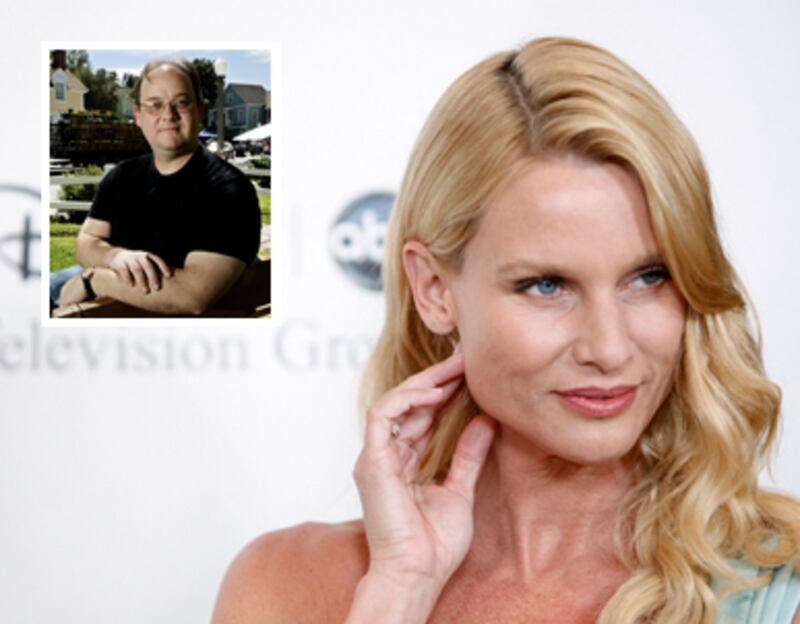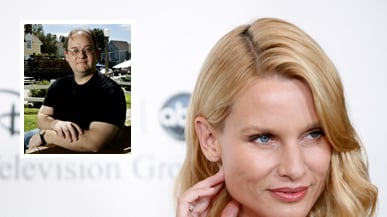Desperate Housewives was an instant success and cultural phenomenon after its Sept. 2004 debut, but it will never compete with Disneyland for the title of Happiest Place on Earth. Beginning on Oct. 17, in Los Angeles Superior Court, real life on Wisteria Lane will be on full display as actress Nicollette Sheridan faces off against Desperate Housewives creator and executive producer Marc Cherry and ABC Studios in a wrongful termination lawsuit that seeks to resolve once and for all: Why did Cherry really kill off Edie Britt, the vampy, trashy resident of Wisteria Lane, in an April 2009 episode?
Did Cherry get rid of Edie out of revenge after he slapped Sheridan across the head and she complained to his ABC bosses, as Sheridan maintains? Or did he make a creative and cost-cutting decision, as he alleges? Sheridan, who earned $4.2 million during her last season on the show, appeared in 112 episodes and filed her $20-million lawsuit on April 5, 2010.
"Mr. Cherry was the creator of the show that I worked on," Sheridan said in a declaration on April 19 of this year. "He was my boss. Bosses are not supposed to hit the people that work for them. Men are not supposed to hit women."
A jury will decide these matters. In the meantime, the case file provides a revealing, if not entertaining, look at the inner workings of Desperate Housewives.
Here's a look at 11 juicy moments from the lawsuit, as recorded in the court file obtained by The Daily Beast.
1) Since 2004: Sheridan described Mr. Cherry as "extremely controlling with respect to the scripts, particularly when the female actors on the show would propose script changes." She said he regularly met with the male actors to discuss lines or story arcs but once became enraged when Teri Hatcher complained to ABC about her character in the show's early days. "Mr. Cherry was so upset that I heard him outside my trailer talking about something," Sheridan said in a declaration. "I invited him into my trailer, and he began ranting about Ms. Hatcher's complaints about the writing, that he hated her, that he should have listened to everybody else and should not have hired her, and that he hoped she'd get hit by a car and die."
But Sheridan said she found it difficult to go to work afterwards, became ill, and needed to take her dog, Oliver, to work with her for moral support.

2) July 2007: At Eva Longoria's wedding to Tony Parker, Sheridan said, "Mr. Cherry commented that 'Tony must like boys, because he is marrying this—this little, small girl with no tits and—that looks like a boy.'"
3) July 2008: While rehearsing a scene in a pizzeria, according to Sheridan, Mr. Cherry became angry and abusive and raised his voice when she asked him questions about the dialogue for a scene they were rehearsing. "Mr. Cherry's comments, which were made in front of cast and crew, were demeaning and uncalled for," Sheridan said.
4) Aug. 2008: After trying to talk to Cherry several times over few months about his "rude behavior, including his reactions and outbursts whenever I had comments on the scripts," Sheridan said she finally met with him. "He apologized for being rude and aggressive with me, saying that he becomes his father, and he's not proud of it."
5) Sept. 24, 2008: During the rehearsal of scene involving Sheridan, James Denton and Neal McDonough, Sheridan approached Cherry to discuss why a line had been removed from her dialogue. In the scene, the two men were practicing the guitar and writing song lyrics and Edie suggests they write a love song and says "She loves you, yeah, yeah, yeah, how hard is that?'" The line, according to Sheridan, had been removed and the scene was not as funny as a result. When she approached Cherry, he told her the line was too expensive "and he dismissively walked towards Denton and McDonough." After the rehearsal, Sheridan approached Cherry again and he motioned her and two others to move toward kitchen area of Edie's home. "When we neared the kitchen, he stopped and asked, 'What is you want?'" I started to say, '"I'll tell you again,'" and at that second, he stepped towards me and hit me hard on the head with his open hand. It was a hard hit. My head jerked. After Marc Cherry hit me, I was stunned. I could not believe what had just happened. I told Marc, 'You just hit me on the head, that's not OK. That is not OK.' He had a stunned look on this face, and I turned to leave and go to my trailer. Marc Cherry came to my trailer approximately half an hour later to apologize for hitting me. That afternoon, I contacted my business lawyer, Neil Meyer, to let him know what happened. I wanted him to speak with [ABC Studios] about Marc Cherry's mistreatment of me, because I wanted to be protected from further attacks."
6) Sept. 25, 2008: Sheridan said she called executive producer George Perkins to tell him what happened. When Perkins asked what he could do to help, Sheridan asked him to talk to Cherry and persuade him to send flowers with an apology. Perkins called Sheridan later to say that Cherry considered the matter resolved and would not be sending flowers. But Sheridan said she found it difficult to go to work afterwards, became ill, and needed to take her dog, Oliver, to work with her for moral support.
7) Oct. 6, 2008: Sheridan suggested to Cherry during an on-set rehearsal that fans of the show might not understand a reference to the Big Bopper in a scene. "His response was, in substance, that I was the idiot and that everybody knows who the Big Bopper is. He yelled at me in front of everyone, including numerous extras who were brought in for that scene to fill the nightclub," she said.
8) Nov. 2008: At a party to celebrate the show's 100th episode, Sheridan said: "Mr. Cherry purposefully had me moved away from him and placed at the end of the row of women when photos were being taken."
9) Dec. 5, 2008: Howard M. Davine, executive vice president of ABC Studios, wrote Sheridan's business lawyer, Neil Meyer, to tell him that a "human resources" investigation had concluded that Sheridan was not mistreated by Cherry. "Rather, Marc simply gave her a light tap on the side of her head for the sole purpose of providing direction for a scene they were rehearsing. As you know, Marc went to her trailer within minutes and apologized for inadvertently upsetting her. While you indicated that the reason you were conveying Nicollette's views of the incident was merely to ensure that I was aware, and while you did not seek any action on ABC's part, I did want you to know that we did conduct this invest and that we found no reason to take any action based on our findings. We consider the matter closed."
10) Feb. 9, 2009: Sheridan received a call from Cherry's assistant that he wanted to meet with her the next morning and "it would be fun." The next morning, she met with him and three other executive producers, and learned Edie was being killed in the next episode. "Marc Cherry stammered and told me that a decision had been made to kill off Edie Britt," Sheridan said. "He told me they were deciding between two characters and the final decision was that Edie would be killed off."
11) April 29, 2009: Jean E. Zoller, ABC's vice president of litigation and employment practices, responded to a letter by Sheridan's former attorney, Marty Singer, stating that the decision to eliminate Edie Britt was made in July 2008. Zoller also wrote that no witnesses supported Sheridan's complaint during the human resources investigation. "All witnesses simply saw Mr. Cherry giving stage directions and physically instructing Ms. Sheridan in the scene she was next to perform, which required a playful tapping of her on-screen husband's head. He did not assault her. When invited during her harassment training on Oct. 1 to bring forward any issues about her work environment, Ms. Sheridan offered none and subsequent to the complaint of incident, Mr. Meyer reported that Ms. Sheridan thought things have been 'great' since then," she wrote.
Editor’s note: An earlier version of this story had the trial as beginning on June 8. It has been postponed to Oct. 17.
Maria Elena Fernandez is a senior entertainment reporter for Newsweek/The Daily Beast. She previously covered television and nightlife for The Los Angeles Times and spent many years on the crime beat, writing for The Washington Post and the Atlanta Journal-Constitution. She also worked at the Fort Lauderdale Sun-Sentinel, where she covered the AIDS epidemic. Her children's book, The Secret of Fern Island , was published in 1996 under a pseudonym so that she wouldn't be stalked by screaming children.






